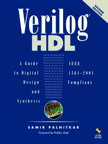6.111 Course Information
| Staff |
| ||||||||||||||||||||||||||
| Prerequisites | Students should feel comfortable using computers. A rudimentary knowledge of electrical/computer fundamentals (6.002, 6.004 6.071) is helpful but not required. As with all project courses the end-of-term cruch can be an issue, so it would be unwise to take another course that also has a significant design project due at the end of term. | ||||||||||||||||||||||||||
| Units | 6.111 is a 12 unit (3-7-2) course with a substantial laboratory component (7 hours per week). The final six weeks -- 72 course hours -- of the semester are devoted to the final project. | ||||||||||||||||||||||||||
| Lectures | TR 2:30p - 4p in 32-144. Lectures are not held during the last six weeks of the course so that you can focus on the final project. See the course calendar for a detailed schedule. | ||||||||||||||||||||||||||
| Recommended reading |
There is no required text for the course, but we recommend the following
book if you would like a more thorough treatment of some of the topics covered
in lecture.
There are many good Verilog books; we strongly recommend that you have access to one. Several Verilog books are available for in-lab checkout from the Digital Instrument Room (38-601).
| ||||||||||||||||||||||||||
| Handouts | On-line versions of the handouts (in PDF) can be found at this website. | ||||||||||||||||||||||||||
| Lecture Problems | A short problem will be handed out during each lecture and your written solution will be due at the start of the following lecture. These should help you practice the design skills introduced by the lecture. Your solutions will be graded and returned. | ||||||||||||||||||||||||||
| Quizzes | There are no quizzes or final exam. | ||||||||||||||||||||||||||
| Labs |
The 6.111 lab is located on the sixth floor of Building 38 (room 38-600). During business hours you can enter via the lab doors from the Building 36 elevator lobby. After business hours the sixth floor entrance is locked and alarmed so you need to enter and leave on the fifth floor and take the internal stairs up to the 6.111 lab. The usual hours of operation are
These times are subject to change, particularly around holidays ; check the signs near the lab entrance and make your plans accordingly. The lab will be staffed by Teaching Assistants (TAs) or Lab Aides (LAs) for some, but not all, of these hours. I am generally in the the lab Sun-Thu in the late afternoon and evenings until closing time. Each student will be issued their own lab supplies including a protoboard, a collection of components used in the assignments, a pair of scope probes, a pair of analyzer probes, and some hand tools. While wiring and some debugging can be done at home, most assignments require the use of an oscilloscope, logic analyzer and other special equipment, all of which are available in the lab. The FPGA Laboratory Kit can be found at each lab bench. Additional equipment and parts may be checked out from the course staff. Remember to put your name on anything that you build in the laboratory and leave unattended, otherwise it may be gone when you return. There are some lockers for the safe storage of your supplies along the 6th floor entry corridor; to get one for the semester please ask the course staff. There are five lab assignments to be completed individually. For each lab you will be asked to turn in a report (or your verilog code) in addition to completing a checkoff with a member of the course staff. Checkoffs can happen anytime the lab is staffed on Mon-Wed, and by appointment (via sign-up sheet) on Thursdays 6-9. The coming week's sign-up sheet is posted at 5pm on Sundays. There is a 20%/day late penalty for work completed 1 to 5 working days after the due date. No credit will be given for unexcused lateness exceeding 5 days. Note that each lab has multiple, often substantial, tasks you need to complete and it is unlikely that you'll be able to complete the work in one sitting (e.g., the day the lab is due). The lab and staff are very busy just before an assignment is due so please plan accordingly. | ||||||||||||||||||||||||||
| CI-M Requirement |
6.111 is one of the courses that satisfies the EECS Communication-Intensive (CI-M) third-year class requirement. Even if you have satisfied the requirement in some other way, you will need to prepare a report as described below. The writing department and 6.111 staff will grade and provide feedback on major components of your final project (both writing and technical): project proposal writeup and project presentation. You will need to incorporate this feedback, along with more details about the project into your final project report. The final project report writeup will also be graded by the writing department and 6.111 staff. The grade for all these components will contribute 15% to your final grade in 6.111. | ||||||||||||||||||||||||||
| Final Project |
Note: you must complete all the labs before starting the final project. We've learned over the years that if you're struggling with the labs then it's unlikely that you'll be able to successfully complete a final project. The Final Project is the most important assignment -- you'll get to design and implement a small digital system of your own choosing, working with one or at most two partners. The last six weeks of the term are devoted exclusively to working on the project and its accompanying report. We'll be providing lots of information about the project as the term progresses, but here's a quick list of the project milestones:
| ||||||||||||||||||||||||||
| Collaboration |
The Departmental Guidelines Relating to Academic Honesty require that
we inform you of our expectations regarding permissible academic
conduct.
The lecture problems and labs should be done individually. You are welcome to get help from others but the work you hand in must be your own. Copying another person's work or allowing your work to be copied by others is a serious academic offense and will be treated as such by the course staff. | ||||||||||||||||||||||||||
| Grading |
The final grade is determined by your performance on the lecture problems, labs,
and final project:
We construct a histogram of these summary numbers and proceed to discuss the individual performance of each student. Some of the factors considered are:
Traditionally, the average performance (and hence grade) has been quite high in 6.111. A large number of students do "A" level work and are indeed rewarded with a grade of "A". The corollary to this is that, since average performance levels are so high, punting any part of the subject can lead to a disappointing grade. It's very important to keep up with the work. Incompletes will not be given. | ||||||||||||||||||||||||||
 R. H. Katz, G. Borriello
R. H. Katz, G. Borriello D. E. Thomas, P. R. Moorby
D. E. Thomas, P. R. Moorby S. Palnitkar
S. Palnitkar